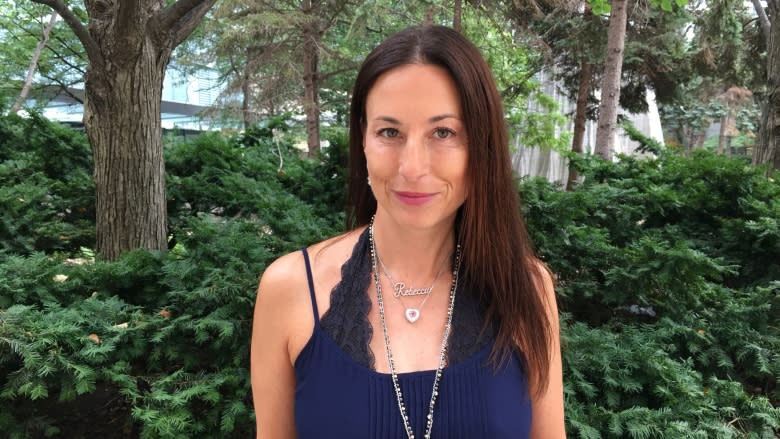Parents should talk about their own marijuana use, says writer and mother
It's time for parents to talk about their own marijuana use with legalization looming, says a Toronto writer and mother of two.
Rebecca Eckler, executive editor of the online magazine SavvyMom.ca, explained that openly talking about the subject would lower the stigma around recreational pot use by parents.
"These conversations need to be had," she said.
"How are we going to discuss this with our children? Should we judge moms who use cannabis? What are the differences between moms who drink a couple of glasses of wine at the end of the day versus someone who has another way to relax? What are the side effects?" she asked.
For many mothers, pot smoking reduces anxiety and helps to ease depression. For those with more serious health issues, it helps relieve pain, she said.
It's socially acceptable for parents to talk openly about drinking alcohol, given that drinking is legal, but it's not yet socially acceptable to talk openly about smoking marijuana, given that recreational use is still illegal, said Eckler, and added that should change.
In an interview with Metro Morning on Tuesday, Eckler said pot smoking is probably a more common activity among parents than most people think.
"Well, first and foremost, I'm not the only mom that occasionally smokes weed. In fact, almost all of my mother friends these days seem to smoke weed recreationally," she said, adding that "marijuana is going to be legal in one year and parents have to start having the conversation."
The federal government hopes to legalize and regulate the use of recreational marijuana by July 2018.
Eckler explained smoking pot "now and then" doesn't make you a bad parent — comparing it to drinking a glass or two of wine. She expressed herself in "Parenting Has Gone to Pot: Why So Many Moms Are Getting High (Including Me!)," an article she wrote for SavvyMom.ca.
Smoking pot helps her relax, Eckler wrote.
"I'm not the first to write about it. In America, they've been writing about it for months," she told Metro Morning.
"Mothers always make these jokes — 'Oh, it's wine time!,' 'It's mommy's happy juice time!' But when it comes to taking a toke, everybody is like — 'Oh, you're a bad mother.' And in my opinion, I don't think it makes you a bad parent."
Eckler has received more than 100 private messages from mothers who smoke pot too, but said they won't discuss it publicly.
"It tells me there's still a stigma. There's embarrassment around it. They won't want their kids to find out," she said.
But Eckler, who has a 13-year-old daughter, Rowan, and a five-year-old son, Holt, said she never smokes pot in front of her children. She smokes outside, in her backyard, while walking the dog, or when her children are visiting their grandparents.
She said she won't admit smoking pot to her daughter at this point because she doesn't want her to think she does it all the time.
Parental use poses risks to teens, kids: doctor
Recreational pot smoking by parents does come with health risks to teens and children, both psychological and physical, said Dr. Christina Grant, an associate professor of pediatrics at McMaster University in Hamilton. It's important to remember their brains are still developing, she explained.
"Obviously, adults can make decisions for themselves around recreational cannabis use. I think when we're talking about children or adolescents, people need to be aware of what the concerns are," said Grant, also a member of the adolescent health committee of the Canadian Pediatric Society.
"I think having open, honest conversations with your older teens about choices you have made is one thing," she said. "As teenagers are asking parents what their habits are, what they've done, I think being on the side of being more open is a probably good thing for that relationship."
While talking about it may be beneficial, the actual activity sends a message that it's acceptable.
"One of the things we do know from research is that parents using cannabis is a green light for teenagers to use cannabis," she said, adding that one in seven teens who experiment with marijuana will develop a cannabis use disorder — a serious substance abuse problem in which cannabis takes over a teen's life, including academic functioning and social activity.
Concerns include smoke, edibles, inattention
As for children, Grant said there is a mistaken perception that second hand smoke from cigarettes is more harmful than that of marijuana but there is no evidence for that claim. Smoking pot in the car and in the home around children is not recommended, she said.
Another risk comes in the form of edibles. About 30 per cent of toddlers who have accidentally ingested edibles require intensive pediatric care, said Grant. And if parents are smoking pot to self-medicate for depression or anxiety, Grant explained there are issues around developing cannabis use disorder which could affect parenting.




